#ASP.NET Web API features
Explore tagged Tumblr posts
Text
ReBlogger
As someone who's had their nsfw blog terminated for far too many times, I've decided to take matters into my own hands & start working on a tool to help people back up & restore & manage their blogs by using a (web)app to leverage the Tumblr API.
The concrete goals of a v1.0 for this project would be to have the ability to:
Back up a list of blogs you are following, so that these can be refollowed on a new blog in case of termination through the application.
Download posts with specific tags, in order to store these posts, should they need to be reuploaded.
Reupload the stored posts to the new blog.
go through the user's followers, for example for my blog, check whether or not the followers have no blog title or description , think empty "untitled/sin titulo/unbeteitelt" blogs, and block them en-masse to purge these bots from your followers.
Current Nice-To-Haves:
The ability to quickly have an overview of your followers' title, description & pinned post if they have one, to create an easier way to vet blogs. Since it's etiquette to have your age clearly visible on your blog in the nsfw community, this should make this process a bit smoother.
The ability to have this app run as a service on your pc, locally, so that you don't need to manually start the app when you turn on your pc, this would enable me to work on auto-back up features.
For this application to be able to be hosted online, with either donations and/or ads to cover hosting services. Currently, if anyone were to try & use the app, they'd need to go through the process of registering their own application & change keys & secrets in the settings. While this isn't the most complicated process, it might be enough of a barrier for some.
Currently, I am working on the app with .net 6/C#, and I'm using Blazor for both frontend & backend. The Blazor frontend uses WASM/Webassembly. Blazor is a component based framework, like Angular or React, but uses C# instead of type-/javascript. Blazor server is very akin to ASP.NET WebAPI
On that note: if you are a .net c# dev, I can strongly suggest giving Blazor a try if you haven't. There is definitely some weirdness since it isn't as mature as Angular or React, but it makes it way more easy for you to get more mileage out of your backend code. Since you can keep the Client & Server in the same solution & share c# objects across both. API calls between the client & server are fairly easy & straightforward to make. It is, however, a departure from the ASP.NET ViewModel paradigm which can take some getting used to.
Please feel free to request any features or things i'd need to pay attention to & I'll consider adding them to the backlog.
Currently, i'm keeping the repo a bit secret in my back pocket, but once i've reached 1.0, i'll share the link with the repository & consider collaboration. I fully intend to open source the project so that the more savvy among you can go through the code & make more targeted suggestions.
2 notes
·
View notes
Text
Essential Tools for .NET Developers

.NET development requires a robust set of tools to enhance productivity, streamline development, and ensure high-quality applications.
Whether you’re building web applications, desktop software, or cloud-based solutions, having the right tools can make a significant difference. Here’s a list of essential tools for .NET developers:
1. IDEs and Code Editors
Visual Studio — The most powerful and widely used IDE for .NET development, offering features like IntelliSense, debugging, and seamless integration with Azure.
Visual Studio Code (VS Code) — A lightweight, cross-platform editor with great extensions for C#, .NET, and debugging.
2. Package Management
NuGet — The default package manager for .NET, allowing developers to install and manage libraries with ease.
3. Build and CI/CD Tools
MSBuild — Microsoft’s build system for compiling, packaging, and deploying .NET applications.
Azure DevOps — Provides CI/CD pipelines, version control, and project management tools.
GitHub Actions — Automates builds, tests, and deployments within GitHub.
Jenkins — A widely used automation tool for building, testing, and deploying applications.
4. Version Control
Git — The most widely used version control system.
GitHub / GitLab / Bitbucket — Popular platforms for hosting Git repositories.
5. Debugging and Profiling
Visual Studio Debugger — A built-in debugger with advanced features for breakpoints, watch variables, and call stacks.
dotTrace — A powerful profiling tool for performance analysis.
PerfView — A Microsoft tool for analyzing CPU usage, memory, and performance bottlenecks.
6. Testing Frameworks
xUnit.net — A modern unit testing framework for .NET.
NUnit — A widely used unit testing framework with rich assertions.
MSTest — Microsoft’s built-in testing framework for .NET applications.
SpecFlow — A BDD (Behavior-Driven Development) framework for .NET.
7. Dependency Injection & Inversion of Control (IoC)
Autofac — A flexible IoC container for .NET applications.
Microsoft.Extensions.DependencyInjection — The built-in DI container for .NET Core and .NET 5+.
8. ORM and Database Management
Entity Framework Core — A modern ORM for .NET applications.
Dapper — A lightweight, high-performance ORM for .NET.
SQL Server Management Studio (SSMS) — A must-have tool for managing SQL Server databases.
9. API Development and Testing
Postman — A popular tool for testing and documenting APIs.
Swagger (Swashbuckle) — Generates interactive API documentation for ASP.NET Core applications.
10. Logging and Monitoring
Serilog — A structured logging library for .NET applications.
NLog — A flexible logging framework.
Application Insights — Microsoft’s monitoring tool integrated with Azure.
11. Cloud & DevOps Tools
Azure SDK for .NET — A set of libraries for interacting with Azure services.
AWS SDK for .NET — For working with AWS services in .NET applications.
Docker — Essential for containerizing .NET applications.
Kubernetes — For orchestrating containerized applications in cloud environments.
12. Productivity and Collaboration
ReSharper — A powerful extension for Visual Studio that enhances code analysis and refactoring.
Notepad++ / WinMerge — Handy tools for quick code edits and file comparisons.
WEBSITE: https://www.ficusoft.in/dot-net-training-in-chennai/
0 notes
Text
Key Features of the .NET Framework Every Developer Should Know
The .NET Framework is a powerful and versatile platform for building web, desktop, and mobile applications. It provides a rich set of tools, libraries, and features that make development efficient, scalable, and secure. Whether you're a beginner or an experienced developer, understanding the core features of .NET is essential for leveraging its full potential.
Here are some key features of the .NET Framework that every developer should know:
1. Common Language Runtime (CLR)
The Common Language Runtime (CLR) is the heart of the .NET Framework. It manages code execution and provides services such as memory management, exception handling, and garbage collection. The CLR allows developers to write code in multiple languages (C#, VB.NET, F#) and ensures that they all compile to a common intermediate language (CIL).
Why it matters:
Enables cross-language interoperability
Improves performance and security
Manages application memory efficiently
2. Base Class Library (BCL)
The Base Class Library (BCL) is a comprehensive set of pre-built classes and functions that simplify common programming tasks. It includes libraries for data manipulation, file handling, network communication, security, and more.
Why it matters:
Reduces development time by providing ready-to-use functions
Ensures consistency across different .NET applications
Supports both simple and complex programming needs
3. Language Interoperability
One of the major strengths of .NET is its ability to support multiple programming languages. Whether you're coding in C#, VB.NET, or F#, the CLR allows these languages to interact seamlessly.
Why it matters:
Developers can choose the language that best suits their needs
Teams can work with multiple languages in the same project
Encourages code reuse and modular development
4. Garbage Collection (Automatic Memory Management)
.NET includes an automatic garbage collector that manages memory allocation and deallocation. This prevents memory leaks and ensures efficient use of system resources.
Why it matters:
Improves application performance
Reduces the risk of memory-related errors
Simplifies memory management for developers
5. Security and Authentication
Security is a top priority in modern applications, and .NET provides robust security mechanisms, such as:
Code Access Security (CAS): Controls what code is allowed to do based on security policies
Role-Based Security: Restricts access to certain functionalities based on user roles
Encryption and Cryptography Libraries: Securely store and transmit sensitive data
Why it matters:
Protects applications from unauthorized access
Ensures data integrity and confidentiality
Supports modern authentication mechanisms like OAuth and JWT
6. ASP.NET for Web Development
ASP.NET is a powerful framework within .NET that enables developers to build dynamic and high-performance web applications. It supports:
ASP.NET MVC: A structured framework for building scalable web applications
ASP.NET Core: A cross-platform, high-performance framework for modern web apps
Blazor: A framework for building interactive web UIs using C# instead of JavaScript
Why it matters:
Enables rapid web application development
Supports both server-side and client-side development
Integrates well with cloud services and APIs
7. Windows Presentation Foundation (WPF) and Windows Forms
For desktop application development, .NET provides WPF and Windows Forms frameworks:
WPF: Used for building modern, visually rich UI applications
Windows Forms: Ideal for traditional Windows desktop applications
Why it matters:
Provides a seamless way to build desktop applications
Supports UI customization and multimedia integration
8. Entity Framework (EF) for Database Management
.NET includes the Entity Framework (EF), an Object-Relational Mapper (ORM) that simplifies database interactions. Developers can use LINQ (Language Integrated Query) to retrieve and manipulate data using C# instead of writing SQL queries.
Why it matters:
Reduces the complexity of database management
Supports multiple databases like SQL Server, MySQL, and PostgreSQL
Makes data manipulation more intuitive and efficient
9. Cross-Platform Development with .NET Core
.NET Core (now merged into .NET 5 and later versions) allows developers to build applications that run on Windows, Linux, and macOS. This makes .NET a great choice for cross-platform development.
Why it matters:
Expands the reach of .NET applications beyond Windows
Enables deployment on cloud platforms and containers
Provides high performance and scalability
10. Microservices and Cloud Integration
.NET is optimized for microservices architecture and integrates seamlessly with cloud platforms like Microsoft Azure and AWS. It supports Docker and Kubernetes for containerized applications.
Why it matters:
Helps build scalable, cloud-native applications
Supports API-driven development and DevOps workflows
Ensures flexibility in deployment and scaling
Conclusion
The .NET Framework is a powerful, flexible, and scalable platform that simplifies application development. Whether you're working on web applications, desktop software, or cloud-based solutions, .NET offers the tools and libraries needed for efficient development. Understanding these key features will help developers make the most of .NET and build robust, high-performance applications.
0 notes
Text
Price: [price_with_discount] (as of [price_update_date] - Details) [ad_1] Publisher's Note: Microsoft ceased support for .NET Core 3.0 in March 2020. A new edition of this book is available that uses .NET 6 (an LTS release with support up until November 2024), C# 10, and Visual Studio 2022, as well as Visual Studio Code. Key Features: Build modern, cross-platform applications with .NET Core 3.0Get up to speed with C#, and up to date with all the latest features of C# 8.0Start creating professional web applications with ASP.NET Core 3.0Book DescriptionIn C# 8.0 and .NET Core 3.0 - Modern Cross-Platform Development, Fourth Edition, expert teacher Mark J. Price gives you everything you need to start programming C# applications.This latest edition uses the popular Visual Studio Code editor to work across all major operating systems. It is fully updated and expanded with new chapters on Content Management Systems (CMS) and machine learning with ML.NET.The book covers all the topics you need. Part 1 teaches the fundamentals of C#, including object-oriented programming, and new C# 8.0 features such as nullable reference types, simplified switch pattern matching, and default interface methods. Part 2 covers the .NET Standard APIs, such as managing and querying data, monitoring and improving performance, working with the filesystem, async streams, serialization, and encryption. Part 3 provides examples of cross-platform applications you can build and deploy, such as web apps using ASP.NET Core or mobile apps using Xamarin.Forms. The book introduces three technologies for building Windows desktop applications including Windows Forms, Windows Presentation Foundation (WPF), and Universal Windows Platform (UWP) apps, as well as web applications, web services, and mobile apps.What you will learn: Build cross-platform applications for Windows, macOS, Linux, iOS, and AndroidExplore application development with C# 8.0 and .NET Core 3.0Explore ASP.NET Core 3.0 and create professional web applicationsLearn object-oriented programming and C# multitaskingQuery and manipulate data using LINQUse Entity Framework Core and work with relational databasesDiscover Windows app development using the Universal Windows Platform and XAMLBuild mobile applications for iOS and Android using Xamarin.FormsWho this book is forReaders with some prior programming experience or with a science, technology, engineering, or mathematics (STEM) background, who want to gain a solid foundation with C# 8.0 and .NET Core 3.0. Publisher : Packt Publishing; 4th ed. edition (31 October 2019) Language : English Paperback : 818 pages ISBN-10 : 1788478126 ISBN-13 : 978-1788478120 Item Weight : 1 kg 400 g Dimensions : 23.5 x 19.05 x 4.26 cm Country of Origin : India [ad_2]
0 notes
Text
.NET Full Stack Development AI + IoT Integrated Course | TechEntry
Join the best DotNet Full Stack Development AI and IoT Integrated Course in 2025. Learn DotNet Core, become a Full Stack Developer, and build advanced web applications with TechEntry.
Why Settle for Just Full Stack Development? Become an AI Full Stack Engineer!
Advance your skills with our AI-driven Full Stack . NET Development course, where you'll seamlessly integrate cutting-edge machine learning technologies with the .NET framework to build sophisticated, data-centric web applications.
Kickstart Your Development Journey!
Frontend Development
React: Build Dynamic, Modern Web Experiences:
What is Web?
Markup with HTML & JSX
Flexbox, Grid & Responsiveness
Bootstrap Layouts & Components
Frontend UI Framework
Core JavaScript & Object Orientation
Async JS promises, async/await
DOM & Events
Event Bubbling & Delegation
Ajax, Axios & fetch API
Functional React Components
Props & State Management
Dynamic Component Styling
Functions as Props
Hooks in React: useState, useEffect
Material UI
Custom Hooks
Supplement: Redux & Redux Toolkit
Version Control: Git & Github
Angular: Master a Full-Featured Framework:
What is Web?
Markup with HTML & Angular Templates
Flexbox, Grid & Responsiveness
Angular Material Layouts & Components
Core JavaScript & TypeScript
Asynchronous Programming Promises, Observables, and RxJS
DOM Manipulation & Events
Event Binding & Event Bubbling
HTTP Client, Ajax, Axios & Fetch API
Angular Components
Input & Output Property Binding
Dynamic Component Styling
Services & Dependency Injection
Angular Directives (Structural & Attribute)
Routing & Navigation
Reactive Forms & Template-driven Forms
State Management with NgRx
Custom Pipes & Directives
Version Control: Git & GitHub
Backend
.NET
Introduction to C#
What is C#?
Setting Up a C# Development Environment
Basic Syntax and Data Types in C#
Control Structures: If Statements, Loops
Methods and Parameters
Object-Oriented Programming Concepts
Classes and Objects
Inheritance and Polymorphism
Interfaces and Abstract Classes
Exception Handling in C#
Working with Collections: Arrays, Lists, Dictionaries
Introduction to .NET
Overview of .NET Framework and .NET Core
Differences Between .NET Framework and .NET Core
Understanding Networking and HTTP Basics
REST API Overview
ASP.NET Core Development
Creating a Basic ASP.NET Core Web API Project
Project Structure and Configuration in ASP.NET Core
Routing and URL Patterns in ASP.NET Core
Handling HTTP Requests and Responses
Model Binding and Validation
JSON Serialization and Deserialization
Using Razor Views for HTML Rendering
API Development with ASP.NET Core
CRUD API Creation and RESTful Services
Entity Framework Core Overview
CRUD Operations with Entity Framework Core
Database Connection Setup in ASP.NET Core
Querying and Data Handling with LINQ
User Authentication and Security
Advanced API Concepts
Pagination, Filtering, and Sorting
Caching Techniques for Performance Improvement
Rate Limiting and Security Practices
Logging and Exception Handling in ASP.NET Core
Deployment and Best Practices
Deployment of ASP.NET Core Applications
Best Practices for .NET Development
User Authentication Basics in ASP.NET Core
Implementing JSON Web Tokens (JWT) for Security
Role-Based Access Control in ASP.NET Core
Database
MongoDB (NoSQL)
Introduction to NoSQL and MongoDB
Understanding Collections and Documents
Basic CRUD Operations in MongoDB
MongoDB Query Language (MQL) Basics
Inserting, Finding, Updating, and Deleting Documents
Using Filters and Projections in Queries
Understanding Data Types in MongoDB
Indexing Basics in MongoDB
Setting Up a Simple MongoDB Database (e.g., MongoDB Atlas)
Connecting to MongoDB from a Simple Application
Basic Data Entry and Querying with MongoDB Compass
Data Modeling in MongoDB: Embedding vs. Referencing
Overview of Aggregation Framework in MongoDB
SQL
Introduction to SQL (Structured Query Language)
Basic CRUD Operations: Create, Read, Update, Delete
Understanding Tables, Rows, and Columns
Primary Keys and Unique Constraints
Simple SQL Queries: SELECT, WHERE, and ORDER BY
Filtering Data with Conditions
Using Aggregate Functions: COUNT, SUM, AVG
Grouping Data with GROUP BY
Basic Joins: Combining Tables (INNER JOIN)
Data Types in SQL (e.g., INT, VARCHAR, DATE)
Setting Up a Simple SQL Database (e.g., SQLite or MySQL)
Connecting to a SQL Database from a Simple Application
Basic Data Entry and Querying with a GUI Tool
Data Validation Basics
Overview of Transactions and ACID Properties
AI and IoT
AI & IoT Development with .NET
Introduction to AI Concepts
Getting Started with .NET for AI
Machine Learning Essentials with ML.NET
Introduction to Deep Learning
Practical AI Project Ideas
Introduction to IoT Fundamentals
Building IoT Solutions with .NET
IoT Communication Protocols
Building IoT Applications and Dashboards
IoT Security Basics
You're Ready to Become an IT Professional
Master the Skills and Launch Your Career: Upon mastering Frontend, Backend, Database, AI, and IoT, you’ll be fully equipped to launch your IT career confidently.
TechEntry Highlights
In-Office Experience: Engage in a collaborative in-office environment (on-site) for hands-on learning and networking.
Learn from Software Engineers: Gain insights from experienced engineers actively working in the industry today.
Career Guidance: Receive tailored advice on career paths and job opportunities in tech.
Industry Trends: Explore the latest software development trends to stay ahead in your field.
1-on-1 Mentorship: Access personalized mentorship for project feedback and ongoing professional development.
Hands-On Projects: Work on real-world projects to apply your skills and build your portfolio.
What You Gain:
A deep understanding of Front-end React.js and Back-end .NET.
Practical skills in AI tools and IoT integration.
The confidence to work on real-time solutions and prepare for high-paying jobs.
The skills that are in demand across the tech industry, ensuring you're not just employable but sought-after.
Frequently Asked Questions
Q.) What is C#, what are its main features, and why is it a good choice for software development?
A: Ans: C# is a versatile and powerful programming language developed by Microsoft. It's widely used for web, desktop, and game development, offering numerous career opportunities in software development.
Q: Why should I learn Angular?
A: Angular is a powerful framework for building dynamic, single-page web applications. Learning Angular can enhance your ability to create scalable and maintainable web applications and is highly valued in the job market.
Q: What is .NET?
A: .NET is a comprehensive software development framework created by Microsoft. It supports the development and running of applications on Windows, macOS, and Linux. With .NET, you can build web, mobile, desktop, gaming, and IoT applications.
Q: What are the prerequisites for learning Angular?
A: A basic understanding of HTML, CSS, and JavaScript is recommended before learning Angular.
Q: What are the benefits of learning .NET?
A: Learning .NET offers several benefits, including cross-platform development, a large community and support, a robust framework, and seamless integration with other Microsoft services and technologies.
Q: What is React?
A: React is a JavaScript library developed by Facebook for building user interfaces, particularly for single-page applications where you need a dynamic and interactive user experience. It allows developers to create large web applications that can change data without reloading the page.
Q: Is C# suitable for beginners?
A: Yes, C# is an excellent language for beginners due to its simplicity and readability. It has a rich set of libraries and tools that make development easier, and it's well-documented, which helps new learners quickly grasp the concepts.
Q: Why use React?
A: React offers reusable components, fast performance through virtual DOM, one-way data flow, and a large community, making it ideal for developing dynamic user interfaces.
Q: What kind of projects can I create with C# and .NET?
A: With C# and .NET, you can create a wide range of projects, such as web applications, mobile apps (using Xamarin), desktop applications (Windows Forms, WPF), games (using Unity), cloud-based applications, and IoT solutions.
Q: What is JSX?
A: JSX is a syntax extension of JavaScript used to create React elements, which are rendered to the React DOM. React components are written in JSX, and JavaScript expressions within JSX are embedded using curly braces {}.
For more, visit our website:
https://techentry.in/courses/dotnet-fullstack-developer-course
0 notes
Text
Upgrading .NET Framework Projects to .NET Core: A Comprehensive Guid

The transition from the .NET Framework to .NET Core is a significant step for modernizing applications. With its cross-platform capabilities, improved performance, and modular architecture, .NET Core (now unified as .NET 6 and beyond) offers a robust framework for building modern applications. In this blog, we will guide you through the process of upgrading your existing .NET Framework projects to .NET Core.
Why Upgrade to .NET Core?
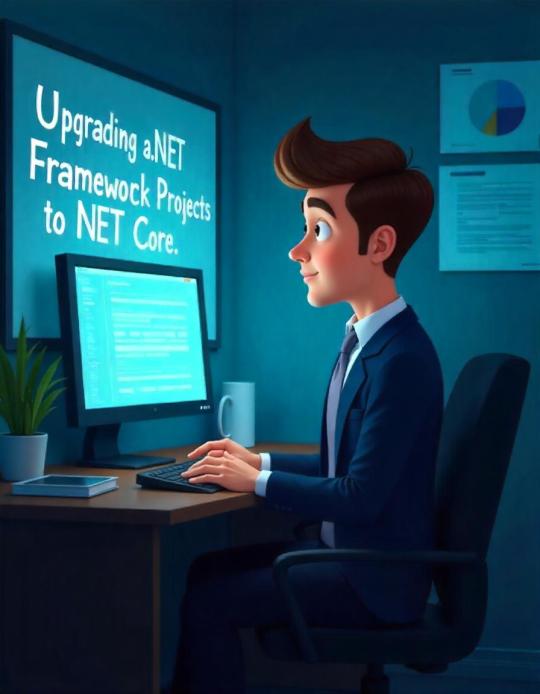
Before diving into the upgrade process, let’s understand why upgrading is beneficial:
Cross-Platform Development: Build and run applications on Windows, macOS, and Linux.
Improved Performance: Optimized runtime and faster execution.
Unified Framework: Support for all application types (desktop, web, cloud, IoT, etc.) under the unified .NET platform.
Active Development: Access to the latest features, security updates, and community support.
Containerization and Cloud: Seamless integration with Docker and cloud services like Azure.
Pre-Upgrade Considerations
Before starting the upgrade, take note of the following:
Compatibility Check: Use the Portability Analyzer to identify unsupported APIs.
Project Type: Not all .NET Framework project types can be migrated directly. Confirm that your project type is supported by .NET Core.
Third-Party Dependencies: Ensure that all third-party libraries and NuGet packages used in your project are compatible with .NET Core.
Testing: Prepare a robust test plan to validate functionality post-migration.
Step-by-Step Upgrade Process

1. Analyze Your Project
Start by analyzing your existing .NET Framework project to determine compatibility and dependencies. Tools like the .NET Upgrade Assistant can automate much of this analysis.
2. Set Up Your Environment
Install the latest .NET SDK.
Update your IDE to the latest version (e.g., Visual Studio 2022).
3. Create a New .NET Core Project
Create a new .NET Core project using your IDE or command line:mkdir MyDotNetCoreApp cd MyDotNetCoreApp dotnet new <project_type>
Replace <project_type> with the appropriate template, such as console, webapi, or mvc.
4. Migrate Code
Copy Code: Move your existing code files into the new project.
Update References: Replace any references to .NET Framework libraries with .NET Core-compatible equivalents.
Replace Configuration: Migrate configuration files (e.g., Web.config to appsettings.json).
5. Update NuGet Packages
Ensure all NuGet packages are compatible with .NET Core. Use the following command to update packages:dotnet add package <package_name>
6. Address API Changes
Resolve API compatibility issues identified during the analysis phase. For unsupported APIs, look for alternative solutions or redesign parts of your application.
7. Rebuild and Test
Rebuild your project and fix any compilation errors.
Run your test suite to verify that the application behaves as expected.
8. Optimize for .NET Core
Leverage .NET Core-specific features such as:
Dependency Injection (DI)
Asynchronous programming with async/await
Lightweight middleware in ASP.NET Core
9. Deploy the Upgraded Application
Deploy your upgraded application to your preferred environment. .NET Core supports cross-platform deployment, so you can now target multiple operating systems.
Common Challenges and Solutions

Unsupported APIs: Use the .NET Compatibility Pack or rewrite code to avoid reliance on deprecated APIs.
Third-Party Libraries: Reach out to library maintainers or explore alternatives if certain libraries are not compatible.
Performance Issues: Profile your application to identify bottlenecks and optimize them using .NET Core’s performance features.
Click here to learn more about ASP.NET
Best Practices
Incremental Migration: Upgrade one project or module at a time instead of migrating everything at once.
Leverage Tools: Use tools like .NET Upgrade Assistant and Portability Analyzer to streamline the process.
Test Rigorously: Conduct extensive testing to ensure functionality, performance, and stability.
Documentation: Maintain detailed documentation of the migration process for future reference.
Extend your knowledge by watching this video
Conclusion
Upgrading from .NET Framework to .NET Core is a strategic move that positions your application for long-term success. While the migration process requires effort and careful planning, the benefits — including cross-platform support, improved performance, and access to modern features — make it worthwhile. By following this guide and adhering to best practices, you can transition your projects smoothly and unlock the full potential of the .NET ecosystem.
Start your migration journey today and take advantage of the future-proof capabilities of .NET Core!
0 notes
Text
The Importance of Security in .NET Applications: Best Practices

When it comes to developing secure applications, there is no room for error. As cyberattacks become increasingly sophisticated, ensuring the security of your .NET applications is more important than ever. With a rapidly growing reliance on web services, APIs, and cloud integrations, .NET developers must stay vigilant about safeguarding their software from vulnerabilities. In this blog, we will explore the importance of security in .NET applications and provide best practices that every developer should follow to protect their applications from potential threats. If you're involved in Dot Net Development, it's crucial to understand how to implement these practices to ensure a secure environment for both users and developers.
Why Security Matters in .NET Applications
.NET is a powerful framework used to build a wide range of applications, from web and mobile apps to enterprise-level solutions. While the framework itself offers many built-in features for developers, such as managed code and type safety, security must still be a priority. Vulnerabilities in your .NET applications can lead to catastrophic results, such as data breaches, unauthorized access, or even financial losses. As a result, focusing on security from the early stages of development can mitigate these risks and provide long-term protection.
Best Practices for Securing .NET Applications
Securing .NET applications doesn't need to be complicated if the right practices are followed. Below, we discuss several key strategies for ensuring the security of your applications:
1. Use Secure Coding Practices
The foundation of secure .NET application development starts with using secure coding practices. This includes:
Input Validation: Always validate user input to avoid SQL injection, cross-site scripting (XSS), and other injection attacks. Use techniques like whitelisting and regular expressions to ensure that data is clean and safe.
Error Handling: Avoid exposing stack traces or any sensitive information in error messages. Instead, log detailed errors server-side and show users a generic message to prevent attackers from gaining insights into your system.
Use Parameterized Queries: Never concatenate user input directly into SQL queries. Use parameterized queries or stored procedures to ensure safe interactions with databases.
2. Implement Authentication and Authorization Properly
In .NET applications, authentication and authorization are vital to securing sensitive data. These two concepts should never be compromised.
Authentication: Use trusted authentication mechanisms such as OAuth or OpenID Connect. ASP.NET Identity is a useful library to implement user authentication and management. Always prefer multi-factor authentication (MFA) when possible to add an extra layer of security.
Authorization: Ensure that users only have access to the resources they are authorized to view. Leverage role-based access control (RBAC) and fine-grained permissions to enforce this principle. This will ensure that even if an attacker gains access to one part of your system, they can't exploit other areas without the proper credentials.
3. Encryption and Data Protection
Encryption is one of the most effective ways to protect sensitive data. When working with .NET applications, always implement encryption both for data at rest (stored data) and data in transit (data being transferred between systems).
Use HTTPS: Always ensure that data transmitted over the network is encrypted by using HTTPS. This can be done easily by enabling SSL/TLS certificates on your server.
Encrypt Sensitive Data: Store passwords and other sensitive data like payment information in an encrypted format. The .NET framework provides the System.Security.Cryptography namespace for secure encryption and decryption. Use strong encryption algorithms like AES (Advanced Encryption Standard).
4. Regularly Update Libraries and Dependencies
In many cases, vulnerabilities are introduced through third-party libraries and dependencies. Using outdated libraries can expose your application to various security risks. To mitigate this, always:
Regularly update all libraries and dependencies used in your .NET application to their latest secure versions.
Use tools like NuGet to check for outdated packages and apply necessary updates.
Consider using a vulnerability scanner to automatically identify any known vulnerabilities in your dependencies.
5. Implement Logging and Monitoring
Security isn't just about preventing attacks; it's also about detecting them when they occur. Implement proper logging and monitoring to track suspicious activities and respond quickly to potential breaches.
Logging: Log every critical event, including login attempts, access control changes, and sensitive data access. Use structured logging to make it easier to analyze logs.
Monitoring: Set up real-time alerts to notify you about abnormal activities or patterns that might indicate an attempted attack.
The Role of Security in Mobile Apps
As more businesses extend their services to mobile platforms, the importance of securing mobile applications has risen significantly. While the underlying principles of securing .NET applications remain the same, mobile apps come with additional complexities. For instance, developers should take extra care in managing API security, preventing reverse engineering, and handling sensitive user data on mobile devices.
To understand the potential costs of developing secure mobile applications, you might want to use a mobile app cost calculator. This tool can help you assess the cost of integrating security measures such as encryption, user authentication, and secure storage for mobile apps. If you're interested in exploring the benefits of Dot net development services for your business, we encourage you to book an appointment with our team of experts.
Book an Appointment
Conclusion
Security is paramount in the development of any .NET application. By implementing secure coding practices, robust authentication and authorization mechanisms, encryption, and regular updates, you can protect your application from the ever-growing threat of cyberattacks. Additionally, leveraging proper logging, monitoring, and auditing techniques ensures that even if a breach does occur, you can identify and mitigate the damage swiftly.
If you're working with .NET technology and need help building secure applications, consider partnering with a Dot Net Development Company. Their expertise will help you implement the best security practices and ensure your applications remain safe and resilient against future threats.
0 notes
Text
Empower Your Business with Custom .NET Software Development by Crown Hill IT Solutions
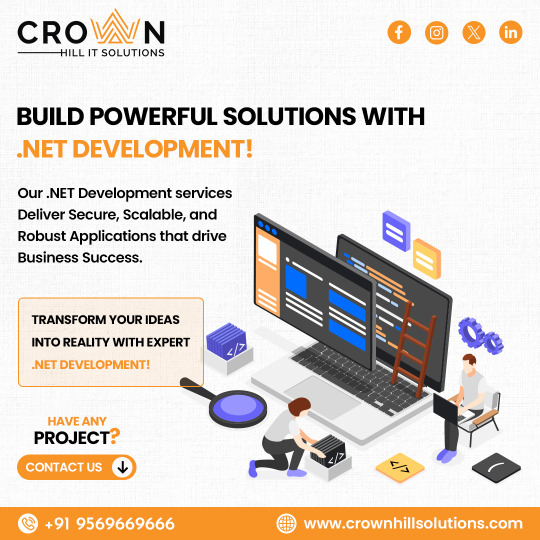
In today's fast-paced digital world, businesses need robust, scalable, and customized software solutions to stay competitive. Crown Hill IT Solutions, a trusted Custom .NET Software Development Company in Mohali, specializes in delivering innovative ASP .NET development services that cater to diverse business requirements. Whether you’re a startup, SME, or an enterprise, our expertise in .NET technologies can help transform your ideas into reality.
Why Choose ASP .NET for Your Business? Microsoft’s ASP .NET framework is a versatile and secure platform for building web applications, enterprise solutions, and APIs. Its ability to support cross-platform development, seamless integration, and enhanced scalability makes it a preferred choice for developers worldwide. Businesses leveraging ASP .NET benefit from:
High Performance: ASP .NET optimizes performance with its asynchronous programming and lightweight architecture.
Scalability: Adaptable to growing business demands with features like dynamic caching and easy integrations.
Security: Advanced security protocols like multi-layer authentication and secure coding practices ensure data protection.
Rapid Development: Streamlined coding structure speeds up the development process without compromising quality.
Crown Hill IT Solutions: Your ASP .NET Development Partner Crown Hill IT Solutions is proud to be a leading custom .NET software development company in Mohali, offering end-to-end ASP .NET services customized to suit your individual business goals. Our team of experienced .NET developers combines technical expertise with creativity to deliver robust, easy-to-use, and scalable solutions.
Our Core ASP .NET Development Services
Custom Web Application Development: Crafting dynamic, high-performance web applications that cater to specific business needs.
Enterprise Software Solutions: Developing scalable and secure enterprise-grade software to streamline operations and enhance productivity.
API Development and Integration: Building seamless APIs for smoother communication between applications and services.
Migration and Upgradation Services: Modernizing legacy systems by migrating to ASP .NET for improved performance and reliability.
Maintenance and Support: Providing round-the-clock support to ensure uninterrupted functionality of your applications.
Industries We Serve We have experience catering to a wide range of industries, including:
Healthcare: Custom software solutions to improve patient care and streamline medical operations.
E-Commerce: Scalable platforms with advanced features for seamless online shopping experiences.
Finance: Secure software for financial management and analytics.
Education: E-learning solutions and virtual classroom management systems.
Why Crown Hill IT Solutions? Choosing Crown Hill IT Solutions means partnering with a team committed to excellence. Our competitive edge lies in:
Experienced Developers: A skilled team with hands-on expertise in ASP.NET technologies.
Custom Solutions: Tailored services that align with your business goals.
Timely Delivery: Agile development processes ensure projects are completed on time.
Affordable Pricing: Cost-effective services without compromising quality.
Get Started Today! Transform your commercial enterprise with modern Custom .NET Software Development Services through Crown Hill IT Solutions. Let us assist you in constructing scalable and steady answers tailor-made to your precise needs. Contact us nowadays to talk about your necessities and enjoy the strength of ASP .NET.
#Crown Hill IT Solutions#Custom .NET Software Development Company#ASP .NET Development Services Mohali
0 notes
Text
Master Angular 18 and ASP.NET 8.0: Your Gateway to Modern Web Development
Web development continues to evolve at an astonishing pace, with frameworks and technologies constantly being updated. If you’re keen on mastering two of the most in-demand skills, Angular 18 and ASP.NET 8.0, you’re on the right track. Together, these tools form a powerhouse duo for creating efficient, scalable, and dynamic web applications. In this article, we’ll explore why these technologies are vital, how they work together, and how you can leverage them to boost your career in web development.
What Makes Angular 18 and ASP.NET 8.0 Stand Out?
Angular 18: A Frontend Marvel
Angular 18, the latest version of Google’s popular TypeScript-based framework, comes packed with features that make frontend development smoother and more efficient. Its ability to handle complex Single Page Applications (SPAs) with ease makes it a go-to for developers. Key highlights include:
Enhanced Performance: Faster rendering and improved change detection.
Streamlined Tooling: Debugging and testing have become easier.
Modular Architecture: Encourages better organization and scalability.
ASP.NET 8.0: Backend Brilliance
ASP.NET 8.0 is a robust framework for building web APIs and dynamic server-side applications. Microsoft has added cutting-edge features in this version, such as:
Minimal APIs: Simplified development for RESTful services.
Better Integration with Blazor: Enhances full-stack development capabilities.
Improved Performance: Faster execution and resource management.
Why Combine Angular and ASP.NET?
Pairing Angular 18 with ASP.NET 8.0 creates a synergy that benefits both developers and end-users. Angular handles the frontend, providing a seamless user interface (UI), while ASP.NET manages the backend, ensuring secure data processing and storage. Together, they deliver high-performing applications that are user-friendly and robust.
Top Features of Angular 18
1. Signals for State Management
Angular 18 introduces Signals, a reactive system for managing state updates. This feature simplifies how data flows within an application.
2. Enhanced Dependency Injection (DI)
Angular’s improved DI makes it easier to manage services and reusable components, ensuring cleaner code.
3. Standalone Components
With standalone components, developers can now build and use components without having to include them in Angular modules, reducing overhead.
Top Features of ASP.NET 8.0
1. Minimal APIs for Simplified Development
Creating web APIs is now faster with minimal boilerplate code.
2. gRPC Performance Enhancements
Efficient communication between services using gRPC ensures better data handling and faster response times.
3. Cross-Platform Compatibility
Run your applications seamlessly across different operating systems.
How to Get Started with Angular 18 and ASP.NET 8.0
1. Setting Up the Development Environment
To begin, ensure you have the following installed:
Node.js and npm: For Angular development.
Visual Studio 2022: Ideal for ASP.NET projects.
.NET 8 SDK: Required for ASP.NET 8.0.
2. Building a Simple Angular Application
Start with a basic Angular project:
bash
Copy code
ng new my-angular-app
cd my-angular-app
ng serve
This command sets up a new Angular project and runs it locally.
3. Creating a Web API with ASP.NET 8.0
In Visual Studio, create a new project and select ASP.NET Core Web API. Add minimal API code like this:
csharp
Copy code
var builder = WebApplication.CreateBuilder(args);
var app = builder.Build();
app.MapGet("/", () => "Hello, World!");
app.Run();
Best Practices for Combining Angular and ASP.NET
1. Use RESTful APIs
Ensure your backend provides RESTful endpoints that your Angular frontend can consume effortlessly.
2. Leverage Dependency Injection
Both Angular and ASP.NET use DI to promote reusable and testable code.
3. Optimize for Performance
Minimize unnecessary API calls and use tools like Angular’s Ahead-of-Time (AOT) compilation to speed up your app.
Building a Real-World Project
Imagine creating an e-commerce platform with Angular 18 as the frontend and ASP.NET 8.0 as the backend. Here’s a high-level breakdown:
Frontend: Angular handles product pages, shopping carts, and user interactions.
Backend: ASP.NET manages user authentication, payment processing, and database operations.
Career Opportunities with Angular 18 and ASP.NET 8.0
1. High Demand in the Job Market
Skills in Angular and ASP.NET are highly sought after, making you a valuable asset to any company.
2. Diverse Roles
From full-stack developer to frontend specialist, mastering these tools opens up numerous career paths.
3. Freelancing and Entrepreneurship
Build your own apps or take up freelance projects, leveraging these technologies.
Learning Resources for Angular 18 and ASP.NET 8.0
1. Online Courses
Look for courses that focus on Master Angular 18 and ASP.NET 8.0 to get hands-on experience.
2. Official Documentation
Both Angular and ASP.NET have detailed guides to help you understand their features and implementation.
3. Community Support
Join forums and developer communities to share knowledge and solve issues.
Common Challenges and How to Overcome Them
1. Steep Learning Curve
Both Angular and ASP.NET have rich ecosystems, which can be overwhelming. Start small and focus on mastering core concepts first.
2. Integration Issues
Ensure your frontend and backend are well-synced by using tools like Postman for testing APIs.
3. Debugging Complex Applications
Utilize debugging tools like Chrome DevTools for Angular and Visual Studio’s debugger for ASP.NET.
Future Trends in Angular and ASP.NET Development
1. Enhanced AI Integration
Expect more AI-powered tools and libraries to integrate seamlessly with these frameworks.
2. Serverless Architectures
ASP.NET is already paving the way for serverless development.
3. Progressive Web Apps (PWAs)
Angular continues to be a preferred framework for building PWAs, ensuring better user experiences.
Conclusion
Mastering Angular 18 and ASP.NET 8.0 is a smart move for anyone looking to excel in modern web development. Together, they offer the perfect combination of power, flexibility, and efficiency, enabling you to build everything from dynamic SPAs to scalable web APIs. Whether you’re a beginner or an experienced developer, these technologies are worth your investment.
0 notes
Text
ASP.net Jobs UK: Your Pathway to a Thriving Tech Career
The demand for ASP.net Jobs UK is surging as businesses transition to dynamic and scalable web applications. ASP.net, a robust server-side framework developed by Microsoft, has become a cornerstone for creating dynamic websites and enterprise-grade applications. If you’re seeking lucrative opportunities in the tech industry, mastering ASP.net can open doors to rewarding career prospects.
Why Choose ASP.net for Your Career?
ASP.net offers a competitive edge in the tech industry due to its powerful features and wide adoption across industries. Here’s why ASP.net is a preferred choice:
Scalability and Performance: ASP.net supports building high-performing applications capable of handling extensive workloads.
Integration with Microsoft Ecosystem: Seamless integration with tools like Visual Studio, Azure, and SQL Server enhances productivity.
Versatility: Ideal for developing web applications, enterprise solutions, and cloud-based services.
The Growing Demand for ASP.net Jobs in the UK
The UK’s tech ecosystem is thriving, creating a wealth of opportunities for skilled ASP.net Jobs UK . Sectors such as finance, healthcare, and e-commerce actively seek ASP.net expertise to modernize their digital infrastructure.
Key Statistics
The UK ranks among the top countries for tech talent demand in Europe.
ASP.net developers in the UK can expect an average salary range of £40,000 to £75,000 annually, depending on experience.
Remote work opportunities for ASP.net jobs have surged, reflecting flexibility in employment options.
Essential Skills for ASP.net Developers
To stand out in the competitive job market, developers must hone specific skills that align with ASP.net development.
1. Core Technical Proficiencies
Proficiency in C# and VB.NET programming languages.
Expertise in MVC architecture for clean and maintainable code.
Familiarity with LINQ and Entity Framework for database operations.
2. Frontend and Backend Knowledge
Competence in frontend technologies like HTML5, CSS3, JavaScript, and libraries like React or Angular.
Mastery of backend frameworks for building secure and scalable APIs.
3. Cloud Integration
Experience with Microsoft Azure for deploying and managing cloud-based applications.
4. Soft Skills
Problem-solving and analytical thinking.
Strong communication skills to collaborate effectively with teams.
Career Paths for ASP.net Developers in the UK
ASP.net developers enjoy diverse career opportunities in the UK. Common roles include:RoleDescriptionAverage SalaryWeb DeveloperBuilds dynamic web pages and applications.£40,000 - £60,000Software EngineerDevelops scalable enterprise software solutions.£50,000 - £75,000Cloud DeveloperIntegrates ASP.net applications with Azure.£55,000 - £80,000Tech LeadManages development teams and projects.£70,000+
How to Land ASP.net Jobs in the UK
Securing a job in the ASP.net domain requires a strategic approach.
1. Build a Robust Portfolio
Showcase your skills with projects demonstrating your proficiency in ASP.net technologies.
2. Certifications
Pursue certifications like Microsoft Certified: Azure Developer Associate to validate your expertise.
3. Job Portals and Networking
Explore job portals such as LinkedIn, Indeed, and Reed.
Attend tech meetups and webinars to connect with industry professionals.
4. Stay Updated
Keep pace with the latest updates in ASP.net Jobs UK to stay relevant.
Diagram: ASP.net Development Workflow
mermaid
Copy code
graph TD A[Requirement Analysis] --> B[Design Architecture] B --> C[Develop Backend Logic] C --> D[Implement Frontend] D --> E[Integrate APIs] E --> F[Test Application] F --> G[Deploy to Azure]
0 notes
Text
ASP.NET Core Development Services Company: Your Partner in Modern Web Development
In today’s fast-paced digital landscape, businesses require robust, scalable, and high-performing web applications to stay competitive. ASP.NET Core, an open-source and cross-platform framework developed by Microsoft, has become a go-to choice for building cutting-edge web solutions. Leveraging this powerful framework, an experienced ASP.NET Core development services company can help you achieve your digital goals effectively.
What Is ASP.NET Core?
ASP.NET Core is a versatile framework designed for building modern web applications. It supports cross-platform development, enabling businesses to deploy applications on Windows, Linux, or macOS. With its modular architecture, built-in dependency injection, and cloud-ready features, ASP.NET Core empowers developers to create fast, lightweight, and highly scalable solutions.
Why Choose an ASP.NET Core Development Services Company?
Collaborating with a specialized ASP.NET Core development company offers several advantages:
Expertise in ASP.NET Core: A professional team has extensive knowledge of ASP.NET Core’s advanced features, ensuring your project is built to meet the highest standards.
Custom Solutions: Companies tailor solutions to match your unique business requirements, delivering functionality that aligns perfectly with your goals.
End-to-End Services: From planning and design to development, deployment, and maintenance, an ASP.NET Core services provider manages the entire lifecycle of your application.
Focus on Performance: Leveraging the framework's performance-optimized capabilities ensures your application runs smoothly under high loads.
Cost-Effective Development: By using reusable components and efficient development practices, you save time and reduce overall costs.
Key Services Offered by ASP.NET Core Development Companies
Custom Web Application DevelopmentTailored web applications that address your business needs, ensuring scalability and security.
API Development and IntegrationBuild robust APIs to connect your application with other systems, enabling seamless data exchange.
Cloud-Based SolutionsLeverage the power of Azure or AWS to create cloud-ready applications with high availability and reliability.
Migration to ASP.NET CoreUpgrade legacy systems to ASP.NET Core for improved performance, scalability, and maintainability.
Enterprise Application DevelopmentCreate powerful enterprise-grade applications that streamline business processes and enhance efficiency.
Support and MaintenanceOngoing support to ensure your application remains secure, up-to-date, and performs optimally.
Industries Benefiting from ASP.NET Core Development
ASP.NET Core is a versatile framework that caters to various industries, including:
Healthcare: Secure patient portals and management systems.
E-commerce: High-performing online stores with seamless checkout processes.
Finance: Robust financial applications with advanced analytics.
Education: E-learning platforms and content management systems.
Retail: Scalable inventory management and CRM tools.
Why Partner with Us?
As a leading ASP.NET Core development services company, we deliver tailor-made web solutions that drive business growth. Our certified developers have years of experience working with ASP.NET Core, ensuring projects are completed efficiently and cost-effectively.
Client-Centric Approach: Your vision is our priority.
Proven Expertise: We’ve successfully delivered numerous ASP.NET Core projects.
Transparent Communication: Regular updates keep you informed at every stage.
Conclusion
Choosing the right ASP.NET Core development services company can be the key to building modern web applications that transform your business operations. Whether you need a custom application, API integration, or migration services, partnering with experienced professionals ensures your project’s success.
Ready to start your ASP.NET Core development journey? Contact us today to discuss your requirements and transform your vision into reality.
#ASP.NET Core Development Services Company#ASP.NET Core Development Services#hire dot net developers
0 notes
Text
Understanding ASP.NET: Empowering Modern Web Development
A Comprehensive Guide
ASP.NET, developed by Microsoft, is a robust framework designed for building dynamic and scalable web applications. Since its inception, ASP.NET has revolutionized how developers create web solutions, offering a seamless environment for creating websites, web APIs, and microservices. In this blog, we’ll explore ASP.NET’s features, benefits, and why it’s a top choice for developers.
What is ASP.NET?
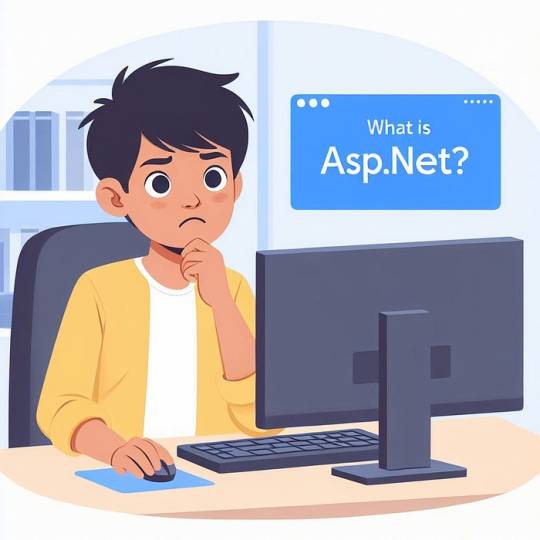
ASP.NET is a free, open-source, server-side web application framework that runs on the .NET platform. It allows developers to create dynamic websites, applications, and services using programming languages like C# and VB.NET. Its modern iteration, ASP.NET Core, is cross-platform, enabling developers to build applications for Windows, macOS, and Linux environments.
Key Features of ASP.NET
High Performance: ASP.NET Core is one of the fastest web frameworks available today. With features like asynchronous programming and efficient request handling, it ensures applications are optimized for speed.
Cross-Platform Compatibility: Unlike its predecessor, ASP.NET Framework, which was restricted to Windows, ASP.NET Core runs seamlessly on Linux, macOS, and Windows, broadening its usability.
Rich Tooling: ASP.NET integrates with Visual Studio, an advanced IDE, offering developers debugging tools, code completion, and templates for faster development.
MVC Architecture: ASP.NET adopts the Model-View-Controller architecture, making it easier to separate concerns, resulting in cleaner and more maintainable code.
Built-In Security: Features like authentication, authorization, and data encryption are integral to ASP.NET, ensuring secure applications by design.
Integration with Front-End Technologies: ASP.NET supports modern front-end frameworks like Angular, React, and Vue.js, allowing developers to create rich user interfaces.
Scalability: ASP.NET is designed to handle high traffic and complex applications efficiently, making it ideal for enterprise-grade solutions.
Advantages of Using ASP.NET
Efficiency: With built-in libraries and support for dependency injection, ASP.NET simplifies the development process.
Versatility: From small websites to large enterprise applications, ASP.NET is suitable for projects of any size.
Community Support: ASP.NET boasts an extensive developer community and rich documentation, making it easier for newcomers to learn and adapt.
Seamless Cloud Integration: ASP.NET works effortlessly with Microsoft Azure, simplifying cloud-based development and deployment.
How to Get Started with ASP.NET
Install the .NET SDK: Visit the official .NET website to download and install the .NET SDK.
Set Up Your Development Environment: Use Visual Studio or Visual Studio Code to create and manage your ASP.NET projects.
Create Your First ASP.NET Project: Run the following command to create a new web application:
dotnet new webapp -o MyFirstApp
4. Run Your Application: Navigate to the project directory and run:
dotnet run
5. Explore and Expand: Dive into the project\u2019s folder structure, experiment with controllers, and learn how to customize views.
Applications of ASP.NET
E-Commerce Websites: ASP.NET’s scalability and security make it an ideal choice for building e-commerce platforms.
Enterprise Applications: With its robust architecture, ASP.NET powers business-critical applications used by organizations worldwide.
Web APIs: ASP.NET is perfect for building RESTful APIs that serve as the backbone for mobile and web applications.
Real-Time Applications: Using SignalR, developers can create real-time applications like chat systems, live dashboards, and notifications.
ASP.NET Framework vs. ASP.NET Core
While the traditional ASP.NET Framework was groundbreaking in its time, ASP.NET Core has taken the framework to new heights. ASP.NET Core is leaner, faster, and cross-platform, making it the preferred choice for new projects. However, the ASP.NET Framework still serves legacy applications and Windows-based systems effectively.
Learning Resources for ASP.NET
For more information about ASP.NET, visit this webpage
This approach makes your content user-friendly by allowing users to click and navigate directly to the resource.
Conclusion
ASP.NET has consistently evolved to meet the demands of modern web development. Its robust feature set, cross-platform capabilities, and seamless integration with cloud technologies make it a go-to framework for developers worldwide. Whether you’re building a personal project or an enterprise-grade application, ASP.NET empowers you to create fast, secure, and scalable solutions. Start your ASP.NET journey today and unlock the potential of this powerful framework!
0 notes
Text
ASP.NET Development: Building Robust Web Applications with Microsoft’s Web Framework
ASP.NET, a powerful, open-source framework developed by Microsoft, is a popular choice for building dynamic, secure, and scalable web applications. Leveraging the .NET ecosystem, ASP.NET offers developers a versatile platform with multiple development models to suit various application needs. Whether you’re creating a small business website, enterprise-grade app, or RESTful API, ASP.NET’s rich toolkit enables the development of fast, reliable, and high-performance web solutions.
In this guide, we’ll cover the fundamentals of ASP.NET development, its core components, benefits, popular tools, and best practices to get you started with building and optimizing web applications on the ASP.NET platform.
What is ASP.NET?
ASP.NET is an open-source web framework designed for building modern web applications, developed as part of the .NET ecosystem. It allows developers to use multiple programming languages, such as C# and VB.NET, to build websites, web APIs, and single-page applications (SPAs). ASP.NET simplifies the development process by offering built-in support for web services, data-driven applications, and scalable APIs.
ASP.NET is compatible with multiple platforms, supporting Windows, Linux, and macOS. It offers various models, including ASP.NET MVC, ASP.NET Web Forms, and ASP.NET Core, each designed to meet different web development needs.
Key Components of ASP.NET
ASP.NET Core ASP.NET Core is a cross-platform, high-performance framework designed for cloud-based, modern applications. It’s modular, lightweight, and works well with containers, making it ideal for building microservices, APIs, and web apps.
ASP.NET MVC (Model-View-Controller) ASP.NET MVC is a development model that separates an application’s logic into three interconnected components: Model, View, and Controller. It promotes organized, testable code and provides developers with full control over HTML, CSS, and JavaScript.
ASP.NET Web Forms Web Forms is a traditional event-driven model that provides a drag-and-drop interface for rapid development. It’s widely used in enterprise applications but is limited to Windows environments.
SignalR SignalR is a library for ASP.NET that enables real-time web functionality by allowing server code to send asynchronous notifications to client-side web applications. It’s widely used in applications like chat apps, gaming, and live dashboards.
Entity Framework (EF) Entity Framework is an ORM (Object-Relational Mapper) that simplifies data access by mapping database objects to .NET objects. EF Core is the latest, cross-platform version of Entity Framework.
Benefits of ASP.NET Development
Cross-Platform Compatibility ASP.NET Core is compatible with Windows, Linux, and macOS, allowing developers to create and deploy applications on multiple platforms and reach a broader audience.
High Performance and Scalability ASP.NET Core is optimized for performance and can handle large amounts of concurrent users, making it suitable for high-traffic applications.
Comprehensive Security Features ASP.NET includes built-in security features such as user authentication, authorization, and data protection, which help secure web applications against threats like SQL injection and XSS attacks.
Extensive .NET Ecosystem ASP.NET benefits from the extensive .NET library ecosystem, allowing developers to integrate with APIs, data access tools, and frameworks that speed up development.
Cloud-Ready and IoT-Friendly ASP.NET is ideal for building cloud-based and IoT applications due to its compatibility with Azure and other cloud platforms. ASP.NET Core’s modular architecture enables developers to create scalable microservices.
Easy Maintenance and Modularity With MVC’s organized structure and ASP.NET Core’s dependency injection, ASP.NET applications are modular and easy to maintain, making them ideal for long-term projects.
Common Use Cases for ASP.NET
Enterprise Web Applications ASP.NET’s robust architecture and support for complex data make it ideal for building ERP, CRM, and other large-scale applications.
eCommerce Platforms ASP.NET provides powerful security features, payment gateway integration, and scalability, making it suitable for building secure and high-performance eCommerce solutions.
RESTful APIs and Web Services ASP.NET Web API or ASP.NET Core can be used to create RESTful APIs, which support cross-platform and mobile applications, making it a strong choice for backend services.
Single-Page Applications (SPAs) Using ASP.NET with client-side frameworks like Angular or React, developers can create SPAs that offer dynamic user experiences and real-time interactions.
Real-Time Applications ASP.NET SignalR enables real-time communication, making it ideal for applications that need real-time updates, such as chat applications, online gaming, and collaborative tools.
IoT and Cloud-Enabled Solutions ASP.NET Core’s compatibility with Docker and Azure allows for the development of microservices and IoT applications that scale seamlessly on the cloud.
Key Tools for ASP.NET Development
Visual Studio and Visual Studio Code Visual Studio is Microsoft’s premier IDE for .NET development, offering a comprehensive suite of tools for coding, testing, and debugging. Visual Studio Code, a lightweight editor, is also widely used for ASP.NET Core development.
SQL Server Management Studio (SSMS) SSMS is a tool for managing SQL Server databases. ASP.NET developers use SSMS for database design, management, and querying.
Postman Postman is used to test and debug APIs. It’s particularly useful for developers working with ASP.NET Web API or ASP.NET Core to validate API endpoints.
Docker ASP.NET Core applications can be containerized with Docker, allowing for easier deployment, scaling, and cross-platform compatibility.
Entity Framework Core EF Core is a lightweight, cross-platform ORM that simplifies data access. ASP.NET developers use it for data modeling and database interactions.
Azure DevOps Azure DevOps is a suite of development tools that provides version control, continuous integration, continuous delivery (CI/CD), and project management tools for ASP.NET development.
Steps to Develop an ASP.NET Application
Define the Project Requirements Start by gathering requirements to determine the application’s purpose, core features, and target audience.
Choose the ASP.NET Development Model Decide whether to use ASP.NET Core, ASP.NET MVC, or ASP.NET Web Forms based on your project’s needs. For modern, cross-platform applications, ASP.NET Core is recommended.
Set Up Your Development Environment Install Visual Studio or Visual Studio Code, and ensure you have the .NET SDK and any required libraries for your chosen development model.
Design the Application Architecture Design a logical architecture based on your application’s complexity. Use MVC or MVVM patterns for clear separation of concerns.
Develop and Configure the Database Use Entity Framework Core or your preferred ORM to define the database structure, relationships, and entities. Set up your data context and repository layers.
Implement Business Logic and Create UI Implement business logic in the controller layer, use models for data, and design views using HTML, CSS, and JavaScript.
Test and Debug Use Visual Studio’s built-in debugging tools and test frameworks to ensure that your application performs as expected. Utilize unit and integration testing for reliability.
Deploy the Application Choose your hosting environment (e.g., Azure, IIS, or Docker) and deploy the application. ASP.NET Core applications can also be containerized and deployed on any cloud service supporting Docker.
Best Practices for ASP.NET Development
Follow MVC or MVVM Patterns Maintain clean code organization by following MVC or MVVM architecture. This approach ensures separation of concerns, making applications easier to maintain and scale.
Optimize Performance Use asynchronous programming (async/await), caching, and minimize database queries to improve performance. Optimize data loading with efficient use of EF Core and proper indexing.
Secure Your Application Use HTTPS, validate user inputs, implement secure authentication (OAuth, OpenID Connect), and follow secure coding practices to protect against threats like SQL injection and CSRF.
Implement Dependency Injection ASP.NET Core has built-in dependency injection. Utilize it to manage object dependencies, making your application modular and easier to test.
Use Logging and Monitoring Implement logging with tools like Serilog or Application Insights to monitor application health and troubleshoot issues in production.
Leverage CI/CD Pipelines Use Azure DevOps or GitHub Actions to automate testing, build, and deployment processes, ensuring fast and consistent delivery of updates.
Document APIs Use tools like Swagger (OpenAPI) for API documentation, making it easy for other developers and applications to interact with your services.
Conclusion
ASP.NET is a versatile framework with powerful features that enable developers to build a wide range of applications, from enterprise-grade solutions to cloud-native and IoT applications. With high performance, security, and a rich ecosystem of tools, ASP.NET continues to be a leading choice for modern web development. By leveraging best practices, robust architecture, and cloud integration, you can unlock ASP.NET’s full potential to create scalable, secure, and high-performance applications that meet today’s business needs.
Explore ASP.NET’s capabilities to see how it can help you build applications that deliver exceptional performance and user experience.
0 notes
Text
Balancing Frontend and Backend: Mastering the Full Stack with .NET
In the world of software development, full stack developers must skillfully manage both the frontend (user interface) and backend (server-side logic) to deliver seamless applications. The Full Stack .NET program equips developers with the tools and techniques necessary to excel in both domains, offering a comprehensive approach to building robust web and software solutions.
Frontend Development with .NET
The frontend is where user interaction happens, involving HTML, CSS, and JavaScript frameworks like Angular or React. With .NET technologies, developers can create interactive and responsive interfaces using Blazor, a framework that allows building web apps with C# rather than JavaScript. This ensures consistency and efficiency, especially for developers familiar with .NET.
Backend Development with .NET
The backend deals with business logic, databases, and application performance. ASP.NET Core plays a pivotal role in backend development, providing a powerful environment for building APIs and web services. This framework supports scalability, enabling smooth data handling and secure communication between the client-side interface and the server.
Mastering the Full Stack
To become a proficient full stack developer, it is essential to master both frontend aesthetics and backend logic. Here’s how .NET helps:
Code Reusability: C# can be used across the frontend (Blazor) and backend (ASP.NET Core), reducing the need to learn multiple programming languages.
Security: .NET offers built-in security features to manage user authentication, ensuring data safety on both ends.
Integration: Developers can seamlessly integrate databases like SQL Server and MongoDB with backend services.
Performance Optimization: Full stack developers must ensure that both ends work harmoniously to prevent bottlenecks, and .NET provides tools for monitoring performance.
Why Balance is Important?
An imbalance between frontend and backend can lead to poor user experiences or inefficient data handling. A well-rounded full stack developer ensures that the UI functions smoothly, backed by a powerful backend system that manages logic and data efficiently.
Mastering the Full Stack .NET program equips developers with the versatility needed to build modern, scalable web applications. Whether you’re looking to work for a company or become a freelancer, this program ensures you’re prepared for both ends of development.
Enroll today to develop the technical skills required to excel in full stack development and stand out in a competitive job market!
0 notes
Text
.NET 7 for ASP.NET Developers: Top Features You Need

ASP.NET developers have a lot to look forward to in .NET 7, with enhancements designed to improve web development workflows. In this article, we cover the key updates that ASP.NET developers should be aware of, from minimal APIs to new cloud-native features. Understanding these changes will help you optimize your web applications for performance and scalability. Sign up for dotNetNews today, and stay updated on the latest ASP.NET, .NET 7, C#, and Azure developments.
0 notes
Text
How we built a Marketplace Platform MVP and integrated Generative AI
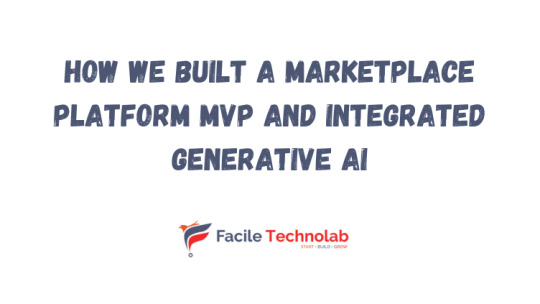
In this article, we will cover how our team helped launch an online marketplace platform mvp.
I'm going to share a story of our collaboration with one of our existing client. He has an amazing idea to innovate the way corporate event happens in the industry.
The client has good understanding of managing software projects. The client believed design thinking and building prototypes is key step to succeed. So, when our first engagement happened, the client had a figma prototype of 60% of the system ready.
The client's expectation was to get guidance on certain areas of the application. He also wanted to hire a team that converts the figma design into working system from start to finish. Since client had prior experience working with us, they contacted us for this new project.
The Marketplace MVP
The marketplace MVP was very easy to use. Being a corporate user, you are organizing corporate event. So, you will use the site to search for service providers. You will request for proposal. For each of the services you need, you can shortlist the quotation received.
Being a vendor, who serves corporate events, you can add your business and services. You can accept the RFP if it's relevant. Generate quote for the RFP received. Get confirmation of acceptance or rejection from the users.
The key features
The key features that we identified during discovery sprint are:
Responsive UI: Users should be able to use the system in the desktop, tablet and mobile devices.
Multilanguage: System should auto detect the user language from the browser. Ability for users to choose/switch their language.
Social Authentication: Ability for users to login with their Google and Facebook accounts.
Google Maps: Ability for users to see a maps view of the business or service listings
Marketing Plans: Monthly subscription for vendors to promote their listings.
Add Ons: One time add Ons for vendors to verify their business, paid profile setups, photo suites etc.
Listings: Ability for users to see the services based on city, category, and other filters.
Request for Proposal: Ability for users to request for proposals from the listing
Receive Quotes: Ability for users to receive quote from the interested vendors
Approve/Reject Quote: Ability for users to shortlist the quote.
ChatGPT Integration: ChatGPT API will help users to generate the language specific content. Here are some examples:
Ability for vendors to generate business and service listing description
Ability for users to generate request for proposal description
Ability for vendors to generate quote
Our approach
We started with a discovery sprint and shortlisted the in scope features. We also identified the gap in the Figma design prototypes and suggested improvements. At the end of the discovery sprint we had vision of in scope mvp features, timeline and budget.
Tech Stack: React.js, Next.js, Redux and Javascript in the front-end. ASP.NET Core, REST API, ASP.NET Web API, Entity Framework Core Code First, Azure SQL, Azure Storage used for back-end. We hosted both back-end and front-end applications in the Azure App Services.
The client engages throughout the project. Client received the dev site hosted on azure after first two sprints. Our team kept updating the dev site after every sprint. The client had flexibility to review and change things as we go.
The result
As we proceed towards the sprints, the client added some important features. Also, updated the UX for some of the modules to be more user friendly. Integrating stripe, google map, language and culture detection was also tricky. Finally, our team deliver all the MVP features with 100% client satisfaction.
Our team stood by the client for any support needed during the beta launch. We will be supporting client as they will go live with the full launch in Jan 2024.
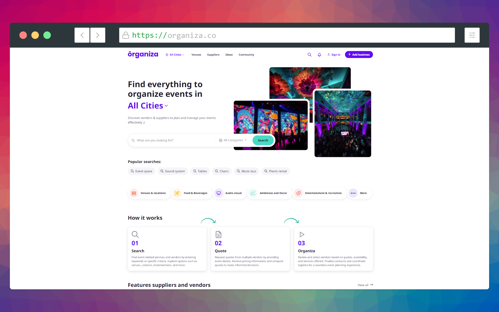
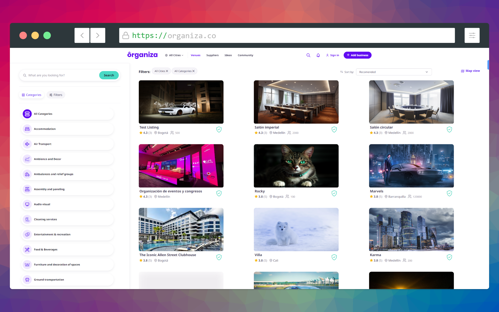
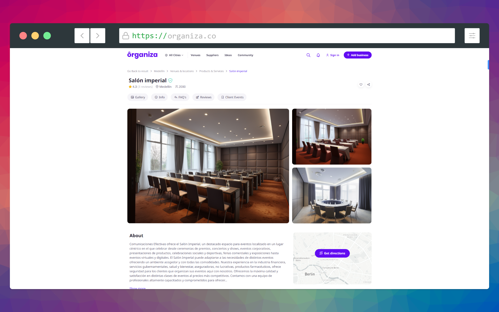
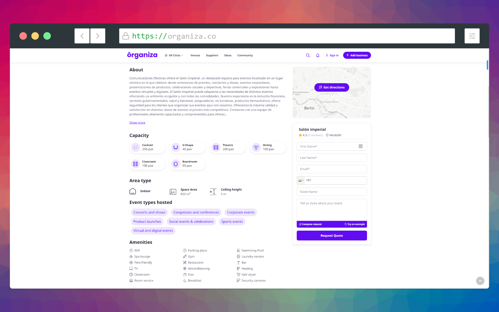
Conclusion
It was yet another successful project delivered! Our first product idea of building a marketplace platform mvp turned into reality! Subscribe to our newsletter to receive a notification as we publish related case study on our website.
Related case study: Online Marketplace Platform MVP for Event Management Industry

#saas development company#saas development services#saas development agency#saas application development service#saas application development solutions#saas app development services#saas development companies
0 notes